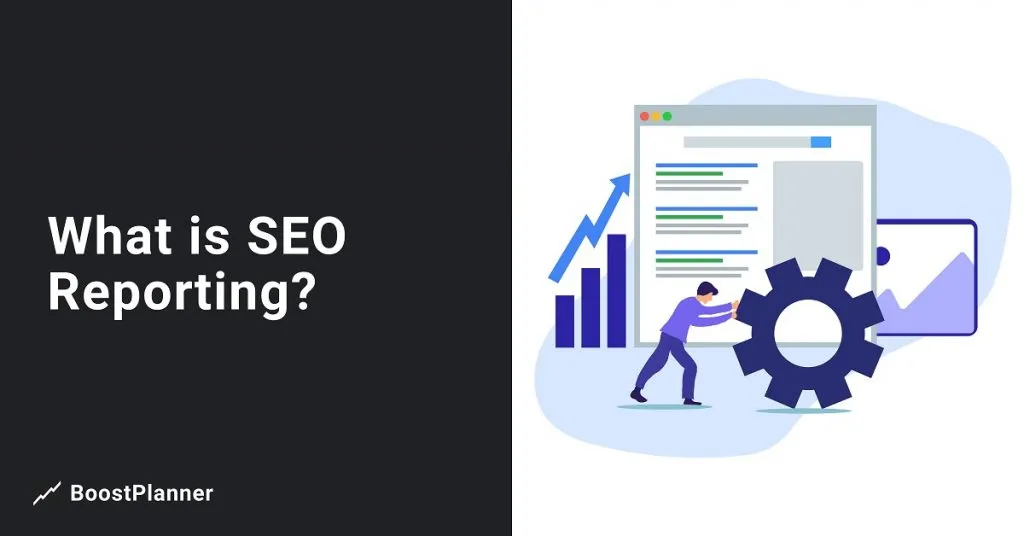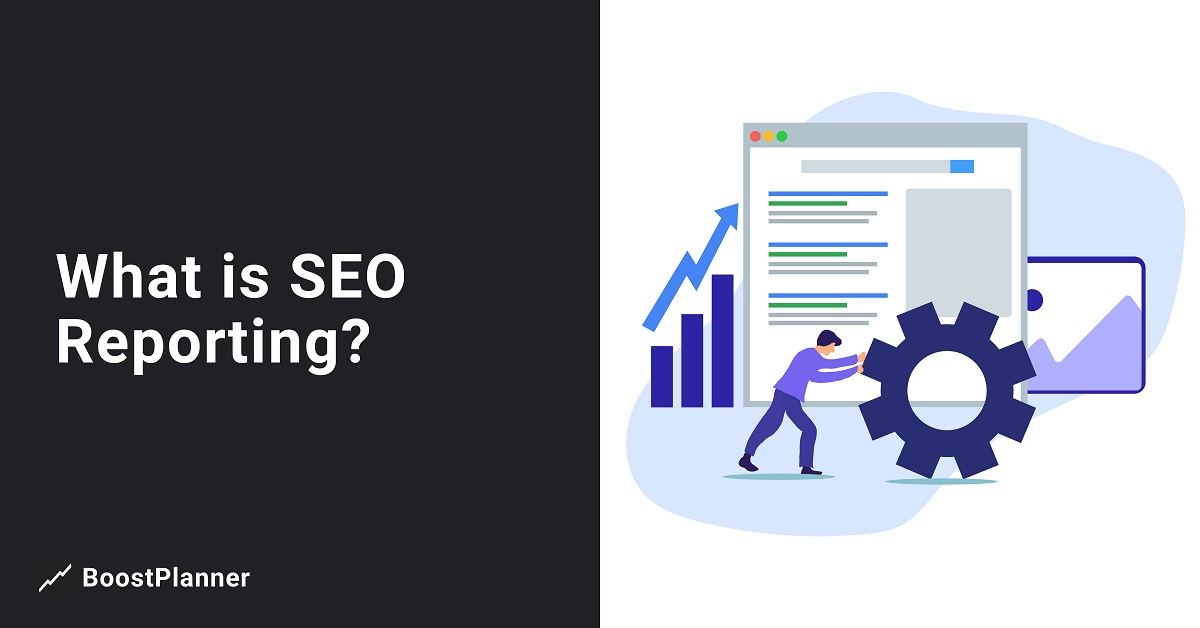
If you're new to search engine optimization (SEO) or creating reports for yourself, your team, or clients, you might be wondering “what is SEO reporting”?
SEO reporting is the practice of tracking and sharing a website's SEO performance. Used by SEO professionals and digital marketers, SEO reporting includes sharing which SEO efforts are working and potential growth opportunities.
Learn more about search engine optimization reporting below, including the common types of SEO reports used when managing SEO campaigns, the key metrics often reported on, and useful features found in SEO reporting software.
Looking for software to create SEO reports?
Check out the best SEO reporting software here for creating SEO reports.
Types of SEO Reporting
There are many types of reporting related to search engine optimization.
Depending on the phase of an SEO campaign and the owner or client's goals, an SEO report could present different sets of marketing data and key performance indicators.
Examples of different types of SEO reporting data:
- SEO audit software that reports technical SEO issues and opportunities based on scanning and analyzing a website's structure, content, and links.
- Keyword research report including data like new organic keywords to target, keyword ranking difficulty, and search volume.
- Competitor analysis report providing insight on competing websites and their content, keyword performance, and link profiles.
- SEO progress or performance report shared on a recurring basis that includes SEO reporting metrics like rankings and organic search traffic.
- Keyword rank tracking report with keyword ranking trends over time.
The above data can be combined into a complete SEO report or as standalone reports. There's no right or wrong type of SEO report.
Types of SEO Report Metrics
When creating an SEO report, you can include a variety of metrics depending on the SEO campaign and the goals of the site owner or client.
Here are some example SEO reporting metrics:
- Changes in web traffic from search engines.
- Keyword ranking positions over time.
- Conversions like calls, form fills, or online sales.
- On-page content issues or opportunities related to elements like headings, meta descriptions, meta tags, keyword usage, and images.
- Site architecture issues or opportunities related to elements like thin or duplicate content, internal linking, fixing broken links, improving site speed, HTTP status codes, and page indexing status.
- Site performance insights like page speed.
- Off-site metrics like changes in backlinks and related opportunities.
- Competitor analysis insights related to links, content topics, and/or keyword targeting opportunities.
You'd likely find SEO reports including many of these SEO metrics when the SEO campaign is rather large or complex and for a larger website.
On the other hand, a small business might prefer simpler monthly SEO reports or updates that share performance metrics like ranking changes, search traffic, and/or conversion progress.
Reporting on Keyword Rankings
Keyword rankings are a key component of search engine optimization reports. SEO reporting for keywords should include:
- Your target keywords
- Current keyword rankings
- Each keyword's landing page
- Rankings by landing page
- Any changes in rankings
- Estimated search volumes
After a couple of months of SEO effort, you should be able to start reporting on historical data trends like tracking keyword positions over time to show progress.
Clicks & Impressions
I recommend including clicks and search impressions once ranking keywords and landing pages start generating these SEO metrics. This includes reporting on clicks and impressions by keywords and then by landing page (landing page being the clicks and impressions generated by a group of keywords).
This data provides insight into which pages are worth investing more optimization time and resources into. Google Search Console (formerly Google Webmaster Tools) makes it easy to analyze, sort, and report on this data.
Recommendation: Google Search Console alone doesn't provide estimated search volume data. Use reliable SEO software like Semrush for its Google Search Console (GSC) integration in order to combine GSC data with Semrush keyword data and the keyword rank tracker tool to really understand your search visibility trends and organic traffic opportunities. Get a Semrush free trial here.
Features of SEO Reporting Tools
Since there's so much data that continues to change and evolve when it comes to SEO, there are some very effective SEO reporting software tools that can help you save a huge amount of time monitoring and reporting on SEO data.
Common useful features of SEO report tools:
- Track historic data for stats like search traffic, rankings, and links.
- Monitor hundreds of keyword rank positions for multiple locations and devices.
- Report and track SEO data for multiple website projects.
- Compare SEO progress between two different time periods.
- Google Analytics and/or Google Search Console integrations.
- SEO report templates or drag-and-drop builder features.
- Ability to export data to CSV files and spreadsheets.
- Automatic report scheduling and delivery options.
- White-label reporting options.
As you can see, SEO software helps save hours of time, especially when working on more than one SEO project. Successful SEO requires tracking, monitoring, and reporting capabilities for many different types of metrics.
Free SEO Reporting Tools
As someone who does SEO for a living, I use a combination of paid and free reporting tools to be able to combine and compare different data sources and trends.
Here are some free SEO report tools provided by Google:
Google Search Console
Report on a website's Google Search presence as detected by Google's web crawlers including the following metrics:
- The number of pages indexed in Google.
- Mobile-friendly, user experience, and indexing issues.
- Keyword clicks, impressions, clickthrough rates, and average position.
- Landing page clicks, impressions, clickthrough rates, and positions.
Tip: Use SEO reporting software that includes rank tracking tools in order to track specific keywords. Often, there is a delay with Google Search Console data.
Use a daily rank tracker to track your target keywords early, see how quickly newly published content starts ranking, and get a better sense of your site's strong content.
Check out Semrush or SE Ranking for all-in-one SEO software with powerful rank tracking features combined with SEO reporting features. Both platforms offer free trials.
Google Analytics
Google Analytics offers free tracking and reporting for website traffic and visitor behavior including the following key metrics:
- Web traffic channels such as organic traffic, direct traffic, and referral traffic.
- Visitor engagement metrics like pages visited, session durations, and bounce rate.
- Location data such as country, region, and city data to assess traffic relevancy.
- Conversion rates for conversion actions such as specific page views, link clicks, form fills, calls, or online sales.
In an SEO report, data from Google Analytics is commonly combined with data related to website optimization efforts and organic keyword positions.
Google Business Profile
You can create reports based on the local insights in your Google Business Profile (previously Google My Business) for Google Search and Google Maps.
Example metrics include:
- Unique views: Google business profile views through Google Search or Maps.
- Direct searches: A visitor searches for the listing's business name or address.
- Discovery searches: A visitor finds the listing by category, product, or service.
- Branded searches: A visitor searched for the brand or a related brand.
- Total searches: The total number of direct, discovery, and branded searches.
- Search queries: The local keywords people searched to find the business listing.
- Other metrics: Direction requests, calls, website clicks, messages, and bookings.
You can access Google Business Profile insights in bulk for verified profiles and download insights into a spreadsheet, including the time frame for your insights data.
Google Keyword Planner
You can use Google Keyword Planner for free keyword research. While it's a free tool built into Google Ads, Keyword Planner is still useful for finding related keywords to target and getting an idea of how competitive and in-demand a keyword is based on estimated cost-per-click (CPC) bids, search volume ranges, and forecasting data.
Report on keyword data such as the following:
- Discover new keywords based on entering a website URL.
- Find related keywords based on entering one or a set of terms.
- See a range of avg. monthly searches for a keyword (ex. 1-10k)
- View how competitive ad placement is (Low, Medium, High)
- See how much advertisers have historically paid for keyword bids.
- Forecasts for keyword clicks, impressions, cost, CTR, and avg. CPC.
You can access exact search volume data if you're running an active Google Ads campaign.
Google Data Studio
Google Data Studio provides free web-based reporting tools for building interactive marketing reports and dashboards.
Data Studio includes the following features for SEO reporting:
- Connect data sources and combine data in interesting ways for SEO reports.
- Example sources – Google Analytics, Google Search Console, Google Sheets
- Built-in sample reports and templates to speed up the process.
- Swap in other data sources into templates for quicker report building.
- Conveniently share reports through shareable links.
- Schedule automated reports to a list of email addresses.
Tip: You can use Google Data studio to combine Google Analytics and Google Search Console data into one SEO dashboard or overview report.
Semrush also offers an integration that lets you feed keyword positions, domain analytics, and site audit information into Google Data Studio.
Google Data Studio is pretty powerful for combining data from multiple sources to create custom reports. It's not the easiest or quickest tool to create reports with but can get more efficient to use once you have SEO report templates you can save and clone.
You can also use Google Data Studio to report on multiple digital marketing efforts, including social media metrics and advertising ROI.
While you can do basic SEO reporting with free SEO tools, paid SEO reporting tools are necessary for access to data related to keyword research, competitor analysis, historical organic traffic and ranking data, and tracking keyword trends efficiently.
Conclusion
Hopefully, you now have a better understanding of what SEO reporting is, including the types of SEO reports you can create, common metrics, and SEO reporting software.
SEO reporting is a key component of search engine optimization that helps guide overall SEO strategy and provides insight into SEO efforts and performance.
SEO Software Guides:
- Best Rank Tracking Software
- Best All-In-One SEO Software
- Best Keyword Research Software
- Best SEO Reporting Software
- Best Local Search Software
- Best SEO Auditing Software
- Best SEO Automation Software
- Best SEO Content Writing Software
- Best Small Business SEO Software
- Best On-Page SEO Checkers
- Best Semrush Alternatives
- Semrush vs SE Ranking
